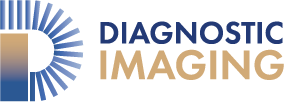A CT scan, also known as a CAT scan, is one of the most popular types of medical imaging. CT scans produce detailed images of a wide variety of structures in the body including organs, bones, soft tissues and blood vessels. A CT exam is most often used to diagnose diseases or injuries or to assist radiologists in planning for other types of treatment.
A CT scan is similar to a traditional x-ray but it provides more detailed images. An x-ray captures one single image of a particular body part. During a CT scan, parts of the machine rotate around to view the body from many different angles. The information is then processed by a computer, which provides images that can be thought of as slices of a loaf of bread, allowing the radiologist to see smaller segments in much greater detail.
What to Expect
Metal objects may affect CT images so you will be asked to remove all jewelry, glasses, dentures or other accessories that may contain metal. You may be given a gown to wear. The technologist will position you on the table in order to get the best view of the body part to be imaged. The table then slides into a large upright circle. The exam is painless and takes about 10-20 minutes.
Depending on the body part being imaged or the reason for your exam, you may receive contrast material as part of your exam. For CT exams, an iodine-based contrast is given through an IV in your arm. Contrast helps radiologists to more clearly visualize certain structures in the body.
The results of your CT scan are communicated to your referring provider 1-2 business days after your exam. If you have questions about your results, you are encouraged to speak with your referring provider, who can discuss your results in detail with you.
Some types of CT scans require special preparation. Please check preparation instructions for your specific type of exam prior to your appointment day.
Risks
- During a CT scan, the patient is exposed to a small level of radiation.
- Radiation doses are closely monitored and do not exceed stringent guidelines set forth by the American College of Radiology.
- In general, CT scans are not recommended for pregnant women because of potential risk to the baby. Always inform your doctor if there is a possibility you may be pregnant.
- Allergic reactions to contrast material are rare, but can occur. Inform your doctor if you have a history of heart disease, asthma, diabetes, kidney disease or thyroid problems as these conditions may increase the risk of an allergic reaction.
Benefits
- CT scans are fast, painless and allows radiologists to see many different types of structures all at the same time including bone, tissue and blood vessels.
- A CT scan has no immediate side effects, and no radiation remains in the body after the exam.
Learn More About Your CT Exam
- Abdomen
- Abdomen and Pelvis
- Bone Density Screening/QCT
- Brain
- Cardiac Score
- Cervical Spine
- Chest (Thorax)
- Dental Scan-Implant Planning
CTA – Computed Tomography Angiography
The links above will take you to detailed examination descriptions. This list may not include every examination performed in this area. For information regarding performance of unlisted procedures, please call our scheduling department at (901) 387-2340.

Convenient Care and a Personal Touch
Ask your provider to refer you to Diagnostic Imaging.
